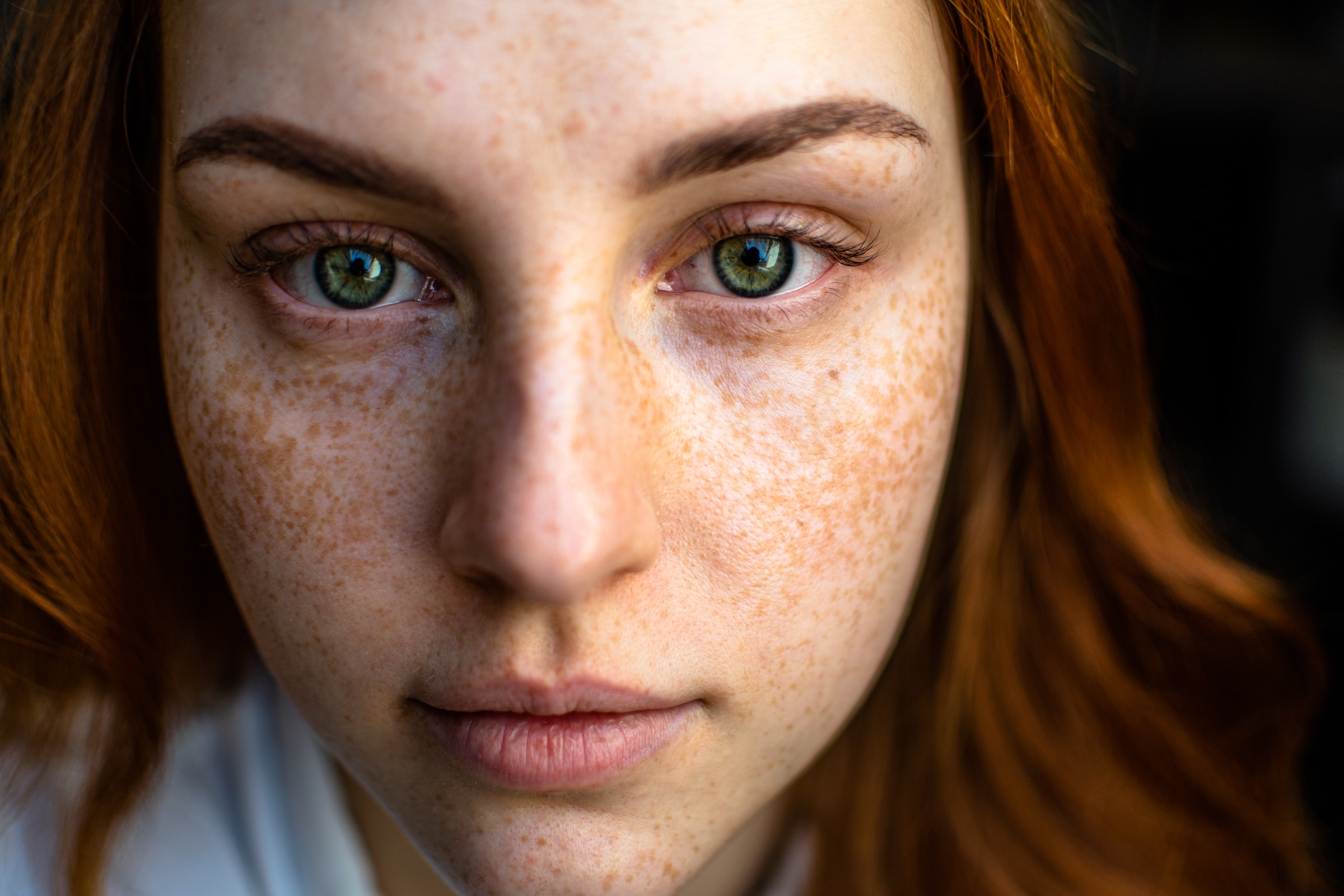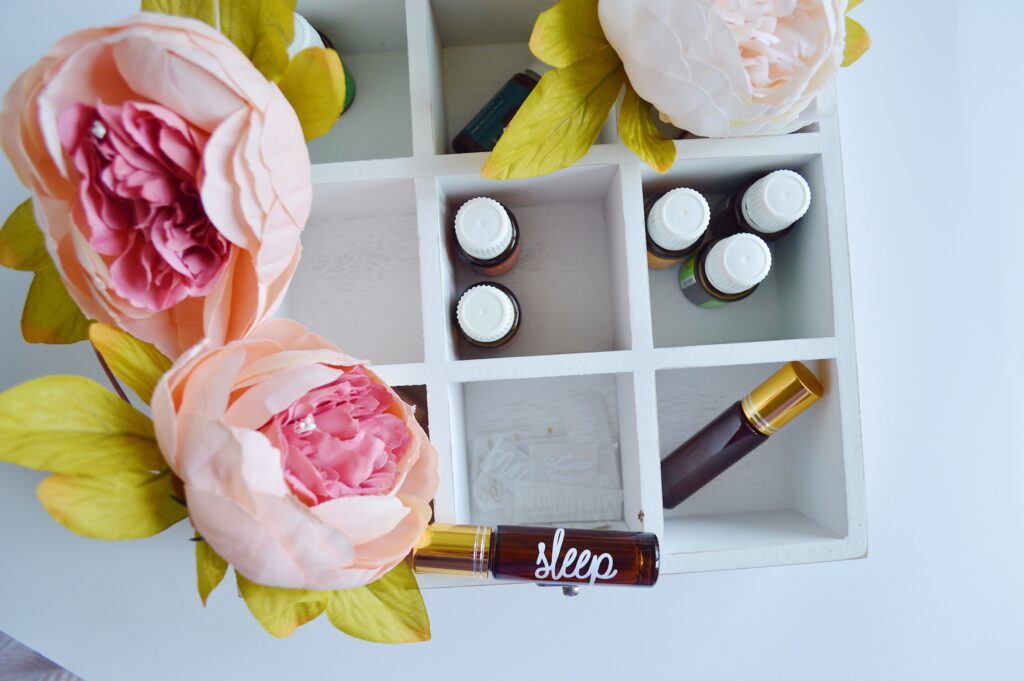Before I share the details about the 24 best essential oils for acne that you can trust, let me share what exactly acne is.
What Causes Acne?
It’s established today that acne isn’t an infectious condition but rather a hereditary one.
Those struggling with acne tend to overproduce certain hormones, leading to an excess of sebum, the natural moisturizer of our body.
When this surplus occurs, it can cause bacteria to become imprisoned within hair follicles, prompting our immune system to react by creating skin blemishes.
In essence, our bodies are over-performing their natural duties, unfortunately resulting in unwanted acne. We can do without such excessive immune responses!
The Role of Essential Oils in Acne Treatment
Industrial soaps and skin care products often feature chemicals that can dehydrate and inflame the skin, triggering more sebum production and subsequent acne outbreaks.
Contrastingly, natural essential oils are a potent alternative to conventional acne treatments, attributed to their assumed antibacterial, antiseptic, and anti-inflammatory capabilities.
These essential oils for acne can eradicate harmful bacteria, maintain clear pores, and facilitate skin healing. Before applying any essential oils topically, checking for potential allergic reactions is essential.
Apply oil drops to your wrist and wait 24 hours to ensure no adverse skin reactions occur.
Best Essential Oils for Acne
I am sharing with you the best 24 essential oils to combat acne.
- Helichrysum Essential Oil
Helichrysum derives from a small plant exhibiting clusters of yellow flowers.
This oil, known for battling acne, provides a purifying and calming effect on the skin, endorsing a healthier complexion. It possesses scar-fading properties as well.
This oil often finds applications in skincare products due to its fresh scent and acne-blemish-reducing capability.
Fragrance: Sweet and earthy
-
Organic German Chamomile Essential Oil
Introduce your skin to this organic oil’s nurturing properties. German Chamomile oil significantly relieves sensitive skin, eruptions, and acne’s complexion.
Fragrance: Herbaceous with a hint of sweetness
-
Manuka Essential Oil
Manuka oil works wonders to calm sensitive skin and moderate acne outbreaks, ensuring a uniform, blemish-less complexion.
Fragrance: Somewhat earthy, herbaceous, with a hint of balsamic
-
Organic Tea Tree Essential Oil
Organic Tea Tree oil assists in purging the complexion of impurities and redundant oils, which is useful for managing acne and breakouts.
Commonly, this oil finds use as a facial blend. Tea tree oil combined with aloe vera and honey creates an excellent facial mask.
Fragrance: Earthy and herbaceous
-
Bergamot Essential Oil
Often employed to elevate moods, the citrusy Bergamot oil does an excellent job of sanitizing oily skin and eliminating acne.
Fragrance: Sweet with a slight citrus kick
-
English Lavender Essential Oil
Known for harmonizing your complexion, English Lavender oil effectively eradicates pimples.
This soothing oil moisturizes the skin and lessens acne for a rejuvenated look. Plus, it’s suitable for all skin types and is considered the top organic oil.
Fragrance: Flowery, comforting with a mild sweetness
-
Egyptian Geranium Essential Oil
Used in Egypt since antiquity for enhancing skin health, Egyptian Geranium oil keeps your skin alive and glowing by curbing acne and irritations.
Fragrance: Sweetly floral with a hint of fruitiness
-
May Chang (Litsea Cubeba) Essential Oil
May Chang oil, also known as Litsea Cubeba, is bright and energizing, often employed to expunge impurities and acne from oily skin.
It’s also noted for its calming effects on the psyche.
Fragrance: A mix of herbal and citrus notes
-
Juniper Berry Essential Oil
Renowned for its soothing and cooling properties, Juniper Berry oil possesses purifying attributes that help alleviate acne breakouts, skin irritations, and sensitivity.
Fragrance: Fresh with an herbal, woody note resembling the spicy aroma of gin
-
Clove Bud Essential Oil
Notable for its cleansing properties, Clove Bud oil minimizes acne and soothes the skin. It can be diluted using any carrier oil for topical utilization.
Fragrance: Earthy, with warmth and spice
-
Thyme Essential Oil
Thyme oil for acne is an organic solution for cleansing oily skin while minimizing breakouts. It’s also effective for hair scalp cleansing to encourage lush hair.
Fragrance: A sweet, herbal fragrance
-
Rosemary Essential Oil
Lab tests suggest Rosemary oil for tackling acne. Rosemary oil is beneficial for reducing redness and inflammation, which aids especially in treating cystic acne.
Fragrance: Mainly herbal
-
Oregano Essential Oil
Oregano oil, used as a spot treatment for acne, is efficient in clearing up pimples and preventing forthcoming breakouts. The answer is affirmative if you’re wondering whether oregano oil is good for acne.
Fragrance: Earthy with an herbal note
-
Organic Peppermint Essential Oil
Organic Peppermint oil is celebrated for its properties conducive to health and can regulate oil production by the skin, reducing the appearance of pimples. It is notably beneficial for itchy, dry skin as it provides relief.
Fragrance: Sweetly minty
-
Roman Chamomile Essential Oil
The azulene compound in Roman chamomile has been recognized to augment skin moisture content. It also carries health-beneficial properties.
When this oil is diluted in a carrier oil, it aids in maintaining skin health. Those allergic to chamomile plants should avoid this oil.
Fragrance: Herbal, sweet, and fruity
-
Sandalwood Essential Oil
Both sandalwood paste and oil are used in skincare. Sandalwood finds extensive use in Ayurveda.
Its properties are instrumental in alleviating the burns caused by acne, making it an exceptional oil to combat the underlying factors linked with acne.
Fragrance: Woody with a sweetness
-
Clary Sage Essential Oil
Clary sage oil is employed to regulate the secretion of sebum. Its compounds, linalyl acetate, and geranyl, are responsible for this effect.
Individuals with an oily skin type can use this oil to mitigate acne. Mixing a drop of these plant oils with a few drops of carrier oil and massaging them onto the face can help make your skin healthier.
Fragrance: Floral with an herbal hint
-
Frankincense Essential Oil
Although frankincense oil’s role in skin care is somewhat limited, people with oily skin use it to reduce acne occurrence.
Fragrance: Sweet with a hint of balsamic
-
Geranium Essential Oil
Geranium oil has alkaline properties that balance the skin. It eliminates acidic content and maintains a stable moisture level in the skin, which has led to its use in manufacturing soaps and various skincare products.
Fragrance: Potently herbal
-
Neroli Essential Oil
Seldom used in skincare, neroli oil, when combined with other oils, balances the sebum content on the skin. Its compound citral is beneficial for the skin.
Fragrance: Floral, citrusy with a bitter undertone
-
Lemon Essential Oil
Derived from lemon peels, this oil possesses powerful health benefits and combats acne. It’s also used to diminish hyperpigmentation.
This oil, rich in Vitamin C, bolsters the immune system.
Fragrance: Strongly lemony
-
Lemongrass Essential Oil
Possessing beneficial health properties, lemongrass oil not only removes dead skin but also tightens the pores, thus maintaining skin elasticity.
Fragrance: Light lemony touch
-
Cinnamon Essential Oil
Cinnamon oil, empowered by cinnamic acid, is an effective solution for skin issues.
This natural skincare ingredient can be used to fight pimples and cysts effectively. It should be combined with a carrier oil like olive or jojoba oil for a gentle application.
Fragrance: A mix of sweet and spicy
-
Ylang Ylang Essential Oil
Ylang Ylang essential oil is recognised for its balancing effect on the skin and ability to check skin pigmentation.
Used regularly, it can diminish acne scarring and improve skin clarity. It also has a utility as a makeup remover, as makeup can irritate skin and worsen acne.
Fragrance: Luxurious, floral, and fruity
Utilising Essential Oils for Acne
Targeted Treatment for Acne with Essential Oils
To tackle persistent acne, use essential oils as a spot treatment. Blend the oil with a carrier oil (like coconut or almond oil), moisten a cotton swab with the concoction, and gently dab it on the acne spot.
Boost Your Preferred Moisturiser
You can enrich your favorite moisturizer by adding a few drops of essential oils to it.
Combined with your daily face cream, the oil is adequately diluted. Massage this blend gently onto your cleansed face.
DIY Oil-based Face Toner
Combine 12 drops of your selected organic oil in a spray bottle with 2 oz of witch hazel. This spray can be used to keep skin moisturized and purified.
DIY Essential Oils for Acne Recipe
For those seeking a natural approach to treating acne, kitchen staples like tea tree and rosemary essential oils are heroes in disguise. To create a DIY essential oil for acne recipe:
- Mix 1 teaspoon each of tea tree and rosemary oil.
- Add 10 drops of this blend to a cotton ball and gently apply it to the acne-afflicted area.
- After a 10-minute pause, rinse with warm water. This treatment can be repeated up to twice daily for visible results.
Precautions
Despite their immense utility, essential oils should be handled carefully to avoid unwanted side effects. Different oils have varying compositions and might not react the same way for everyone.
Pay attention to notable labels and potential allergens when shopping for essential oils. Always dilute the essential oil before application to mitigate adverse effects.
Frequently Asked Questions
People Also Ask These Questions About Essential Oils for Acne
Q: How to Distinguish Between Different Types of Acne?
Distinguishing between acne types is straightforward. The following guide will help you classify:
- Whiteheads are identified as small white bumps on the skin.
- Blackheads are very small dark spots on the skin’s surface.
- Acne papules manifest as red, swollen bumps.
- Pustules are papules that contain pus.
- Acne nodules are deep-seated, painful red bumps.
- Cysts are soft structures filled with pus or other fluids lying deep within the skin.
Q: Which Essential Oils can Help Treat Acne?
Below are essential oils that can prove helpful against acne:
- Thyme
- Rosemary
- Cinnamon
- Sandalwood
- Lavender
- Bergamot
- Ylang ylang
- Lemon
- Tea Tree
Q: What are the Essential Oils for Acne Scars?
The following are top essential oils for acne scars:
- Helichrysum
- Geranium
- Frankincense
- Cedarwood
- Lavender
- Tea Tree
- Neroli
Q: How can I use Tea Tree Essential Oil for Acne?
For an easy application of tea tree oil on acne, mix two drops of the oil with one tablespoon of vegetable oil and lightly apply the blend on the acne-prone zones using clean fingers or a cotton ball.
Q: Does lavender oil reduce acne?
The skin-improving properties of lavender make it an effective remedy against acne; hence, it is incorporated in many skincare products.
Q: Does Peppermint Oil Aid in Acne Treatment?
Peppermint oil is hailed for its skin-cleansing properties. Thus, it is an ideal solution for acne management and overall skincare.
Q: Is Oregano Oil Beneficial for Acne?
Studies indicate that nanoemulsions in oregano oil show promising results in acne treatment, outpacing some cosmetics.
Q: Does Frankincense combat Acne?
The inherent skincare attributes of frankincense essential oil prove beneficial in fighting acne.
Q: Can Jojoba Oil Address Acne Scars?
Research confirms that jojoba oil compounds facilitate the bonding of skin cells; thus, it can be employed to alleviate acne and the resultant scars.
References
- Molecules . (2010). Activities of ten essential oils towards Propionibacterium acnes and PC-3, A-549 and MCF-7 cancer cells https://pubmed.ncbi.nlm.nih.gov/20657472/
- Evidence-Based Complementary and Alternative Medicine (2017). Commercial Essential Oils as Potential Antimicrobials to Treat Skin Diseases https://www.hindawi.com/journals/ecam/2017/4517971/
- Clinics in Dermatology Volume 36, Issue 3. (2018). Aromatherapy, botanicals, and essential oils in acne https://www.sciencedirect.com/science/article/abs/pii/S0738081X18300403
- Int J Cosmet Sci . (2018). The in vitro antimicrobial evaluation of commercially essential oils and their combinations against acne https://pubmed.ncbi.nlm.nih.gov/29574906/
- International Journal of Aromatherapy Volume 14, Issue 1. (2004) The effect of aloe vera gel on the anti-acne properties of the essential oil of Ocimum gratissimum Linn leaf – a preliminary clinical investigation

